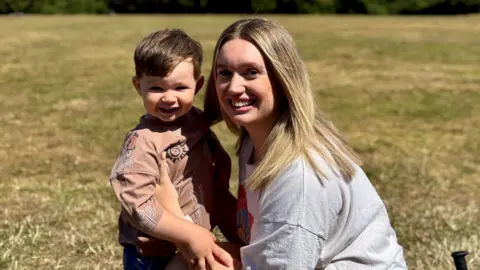'I just didn't feel like I loved my newborn son'
 BBC
BBCA mother who was diagnosed with postnatal depression after suffering intrusive thoughts about harming her newborn baby is calling for more support for women before and after birth.
Karis, 30, from Basingstoke, Hampshire, gave birth to her son Noah two years ago and before she was diagnosed she said felt she "didn't want to be his mum". She now wants her experience to help destigmatise mental illness.
She said women "don't get checked on enough" for mental health issues during the perinatal period, before and after birth.
NHS England said the use of perinatal mental health services was increasing.
Having gone through a traumatic birth experience, Karis recalled how she struggled to connect with Noah and that she hid her feelings for fear he would be taken away from her.
"I just didn't feel like I loved him, I didn't want to be his mum, I didn't want him," she said.
"In the night while breastfeeding, I had thoughts that he was a devil and I had to do something about it.
"The thoughts were really menacing. I remember thinking that I wanted to hurt him. That was the point where I knew I needed help."
Karis eventually contacted her health visitor and was referred to a perinatal mental health team.
She said she was really well cared for after being diagnosed with postnatal depression and obsessive compulsive order, and had since recovered.
However, she believes that more needs be done to encourage women to openly talk about how they are feeling.
She said: "You're getting checked on but you don't get checked on enough and you don't get checked on enough during pregnancy either.
"If someone had asked me at every appointment how I was feeling, I think I might have opened up sooner."

A quarter of women experience perinatal mental health problems and 50% are never diagnosed, according to Dr Alain Gregoire, a consultant perinatal psychiatrist and president of the Maternal Mental Health Alliance charity.
He said it was "absolutely essential" that health service staff who came into contact with women during pregnancy and postnatally were trained in mental as well as physical health.
"Professionals definitely want to look after mental health but they don't have the training and facilities to do that," he said.
Karen Sims, perinatal clinical nurse specialist at Hampshire and Isle of Wight Healthcare NHS Foundation Trust, said pregnancy and early parenthood could be "overwhelming" for new mothers.
She said: "We want people to know they are not alone.
"Our team works closely with midwives, health visitors, primary care and specialist services like the mother and baby unit to make sure support is easy to access."
NHS figures show in the year leading up to April 2025, a record 64,805 women in England accessed specialist perinatal mental health services - an 111.7% increase over the past five years.
Claire Murdoch, NHS England's national mental health director, said pregnancy and motherhood could bring "significant challenges".
She said: "That's why our specialist perinatal mental health teams - made up of psychologists, peer support workers, and midwives - are dedicated to supporting women facing a wide range of difficulties, from prenatal anxiety and birth trauma to severe conditions such as postpartum psychosis."
Karis said she was passionate about speaking openly about what she went through in the hope of helping others.
"Support is absolutely out there but you have to find it," she explained.
"I'm lucky, I've come through it and have a really supportive partner but it's such a lonely time."
If you have been affected by the issues in this story, help and information is available on the BBC Advice Line page
You can follow BBC Hampshire & Isle of Wight on Facebook, X (Twitter), or Instagram.
